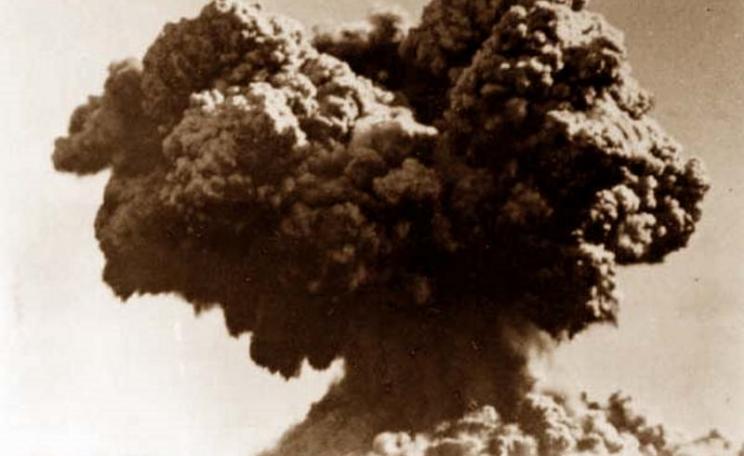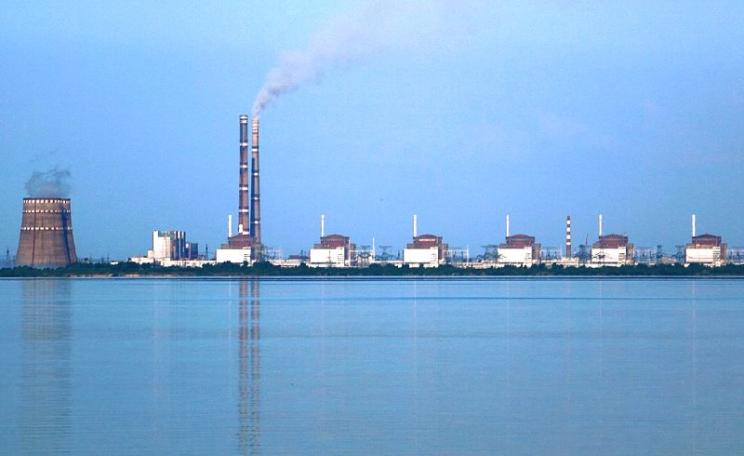Both Fukushima and Chernobyl were the result of the inability of scientists and engineers to foresee how seemingly small problems can snowball into disasters of almost unimaginable scale. Chernobyl remains one of the most tragic incidents of our time.
"From the moment I was informed - by telephone, at five o'clock in the morning on that fateful April 26, 1986 - that fire had broken out in Block Four of the Chernobyl nuclear power plant, my life has never been the same."
The author of these words, Mikhail Gorbachev, is 85 now. His health is failing.
He would like to travel the world and deliver this message. But more often than not, he cannot muster the energy. So in March, he sent an eloquent emissary in his stead, to address a gathering in London.
Gorbachev watched the Unit 4 Chernobyl nuclear reactor explode and melt down and the Soviet Union dissolve during his tenure as premier from 1985-1991.
Arguably it was the Chernobyl nuclear catastrophe that turned him into an environmentalist. By 1992 he had founded Green Cross International, based in Geneva and from whence came his London emissary - Dr. Alexander Likhotal, the organization's current president.
In a public and parliamentary meeting at Westminster's Portcullis House entitled Fukushima 5 Years On, Chernobyl 30 Years On, Gorbachev's words resonated in a room filled mainly with supporters of the organizers, Kick Nuclear, Japanese Against Nuclear UK and London Region CND.
One of the most tragic incidents of our time
In marking those twin, grim anniversaries, Gorbachev reminded us that both Fukushima and Chernobyl were "the result of the inability of scientists and engineers to foresee how seemingly small problems can snowball into disasters of almost unimaginable scale." Chernobyl, Gorbachev said, "remains one of the most tragic incidents of our time."
Indee it was the biggest nuclear disaster of our time, as Dr. Ian Fairlie reminded us two days later at the Cher30byl and Fuku5hima - Beyond Nuclear meetings in Manchester.
"The collective doses are higher for Chernobyl than Fukushima," said Fairlie, who recently updated his 2006 TORCH report (The Other Report on Chernobyl), which was originally produced to debunk the grossly diluted findings in the official 2003-2005 Chernobyl Forum produced by the International Atomic Energy Agency.
"Radiological contamination around Chernobyl was 50 times higher than around Fukushima", said Fairlie, who took pains to point out that this in no way diminishes the seriousness of the Fukushima disaster which occurred in a far more densely populated area than Chernobyl.
Fairlie continues to predict 40,000 fatal cancers as a result of Chernobyl, lower than some estimates but far higher than the 'official' IAEA numbers. He also estimates there have been 6,000 thyroid cases to date, with 16,000 more anticipated.
Both Fukushima and Chernobyl were the result of the inability of scientists and engineers to foresee how seemingly small problems can snowball into disasters of almost unimaginable scale. Chernobyl remains one of the most tragic incidents of our time.
Deaths from PTSD and other disaster-related traumas should be counted
But Fairlie insists that these are not the only numbers that matter. Both Chernobyl and Fukushima, he says, will contribute to many deaths from PTSD, stress and trauma directly related to the nuclear tragedies - which should not be dismissed or discounted.
These troubling statistics, and the prospect of another Chernobyl or Fukushima, says Gorbachev, remind us that "the questions raised by Chernobyl and reiterated by Fukushima are more relevant today than ever before, and they are still unanswered."
Nor, asserts Gorbachev, are the Chernobyl and Fukushima disasters the only serious accidents we should be tallying: "Contrary to the statements of nuclear energy advocates that there were only two major accidents, if one refines an accident to include incidents that either resulted in the loss of human life or significant loss in property damage, a very different picture emerges."
That picture, said Gorbachev, should in fact include a total of 99 nuclear accidents "totaling more than $20.5 billion in damages" which occurred worldwide between 1953 and 2000 averaging "more than one incident and $300 million in damage every year."
Cost-free conservation and renewables
Such a frightening, not to mention costly, pace can be reduced, Gorbachev said, by simple actions that lie in our individual and collective hands: "Supporting new, more efficient technologies has a huge role in reducing waste, but massive improvements can be achieved just by changing behaviors and choices - which costs nothing to do."
On the international political scale, Gorbachev urges that "it is imperative that members of the international community work together to develop and distribute clean and renewable sources of energy." He favors a gradual, rather than rapid, phase-out of nuclear energy, but notes that nuclear power should not be viewed through a narrow lens:
"It is vital that any discussions about nuclear energy address the issue comprehensively and in all its complexity. Nuclear power systems are not just a security issue, an environmental issue, or an energy issue. They are all of those at once."
Most important to Gorbachev is the lesson of transparency that he himself pioneered through "the process of Perestroika and the policy of Glasnost." Governmental openness is taken for granted in many countries and is being fought for in many others.
"Today, people want to have a say in what direction their countries' economies take. They want to know how it affects the air they breathe, the water they drink, the food they eat, and the future they leave to their children. Governments have a responsibility to respond to those concerns."
US regulators claim a major nuclear disaster is too unlikely to be worth preparing for
In the nuclear sector such responsibility is invariably shirked if not suppressed. In highly nuclearized countries such as the US, France and Russia, access to information about nuclear safety is convoluted and opaque, or not available at all.
In the US we have frequently been told by the US Nuclear Regulatory Commission that a major nuclear disaster is effectively too unlikely to be worth preparing for. But these flawed Probabilistic Risk Assessments are designed to protect the nuclear industry from additional expense - not the public from another Chernobyl or Fukushima.
Such a policy is dangerously divorced from reality, as researchers recently found; reseachers that Gorbachev cited when he warned that "the chances are 50:50 that a major nuclear disaster will occur somewhere in the world before 2050."
These are not good odds. Thirty years on, the octogenarian Gorbachev is still haunted by that dawn phone call when he instantly realized "something horrific was happening."
And yet our governments persist in leading us toward the same abyss.
Linda Pentz Gunter is the international specialist at Beyond Nuclear, a Takoma Park, MD environmental advocacy group.







